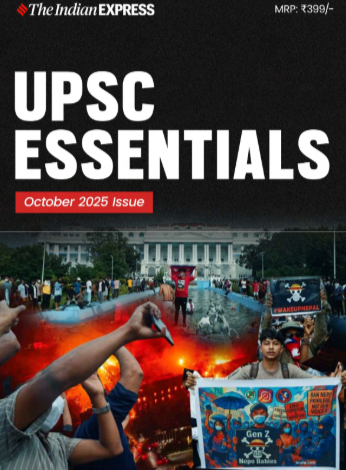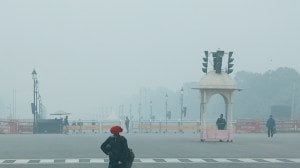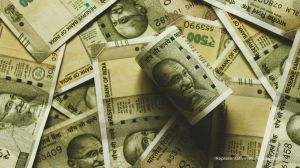Manas Srivastava leads the UPSC Essentials section of The Indian Express (digital). He majorly writes on UPSC, other competitive exams and education-related projects. In the past, Manas has represented India at the G-20 Youth Summit in Mexico. He is a former member of the Youth Council, GOI. A two-time topper/gold medallist in History (both in graduation and post-graduation) from Delhi University, he has mentored and taught UPSC aspirants for more than five years. His diverse role in The Indian Express consists of writing, editing, anchoring/ hosting, interviewing experts, and curating and simplifying news for the benefit of students. He hosts the YouTube talk show called ‘Art and Culture with Devdutt Pattanaik’ and a LIVE series on Instagram and YouTube called ‘LIVE with Manas’.His talks on ‘How to read a newspaper’ focus on newspaper reading as an essential habit for students. His articles and videos aim at finding solutions to the general queries of students and hence he believes in being students' editor, preparing them not just for any exam but helping them to become informed citizens. This is where he makes his teaching profession meet journalism. He is also the editor of UPSC Essentials' monthly magazine for the aspirants. He is a recipient of the Dip Chand Memorial Award, the Lala Ram Mohan Prize and Prof. Papiya Ghosh Memorial Prize for academic excellence. He was also awarded the University’s Post-Graduate Scholarship for pursuing M.A. in History where he chose to specialise in Ancient India due to his keen interest in Archaeology. He has also successfully completed a Certificate course on Women’s Studies by the Women’s Studies Development Centre, DU. As a part of N.S.S in the past, Manas has worked with national and international organisations and has shown keen interest and active participation in Social Service. He has led and been a part of projects involving areas such as gender sensitisation, persons with disability, helping slum dwellers, environment, adopting our heritage programme. He has also presented a case study on ‘Psychological stress among students’ at ICSQCC- Sri Lanka. As a compere for seminars and other events he likes to keep his orating hobby alive. His interests also lie in International Relations, Governance, Social issues, Essays and poetry. ... Read More
UPSC Weekly Quiz— November 6 to 12, 2022
Brush up your current affairs knowledge for this week and consolidate your UPSC-CSE preparation. Find answers along with explanations at the end of the quiz.
 UPSC Weekly news to brush up your current affairs (PTI photo)
UPSC Weekly news to brush up your current affairs (PTI photo)UPSC Weekly Quiz is a current affairs based quiz on some relevant topics from the past week curated for the benefit of aspirants of UPSC and other competitive examination. Attempt weekly quiz every Saturday and find answers to the MCQs with explanation at the end of the article.
Question 1
With reference to the Mangrove Alliance for Climate, consider the following statements:
1. An initiative led by the United Arab Emirates (UAE) and Indonesia, the Mangrove Alliance for Climate (MAC) includes India, Sri Lanka, Australia, Japan, and South Korea.
2. It seeks to educate and spread awareness worldwide on the role of mangroves in curbing global warming and its potential as a solution for climate change.
Which of the statements given above is/are incorrect?
(a) 1 only
(b) 2 only
(c) Both 1 and 2
(d) Neither 1 nor 2
Question 2
With reference to the history of India, consider the following statements:
1. Nadaprabhu Kempegowda, a 16th century chieftain of the Vijayanagara empire, is credited as the founder of Bengaluru.
2. He was from the dominant agricultural Vokkaliga community in south Karnataka.
Which of the statements given above is/are incorrect?
(a) 1 only
(b) 2 only
(c) Both 1 and 2
(d) Neither 1 nor 2
Question 3
Recently seen in news, which of the following cities are correctly matched with their countries
Places Country
1. Kherson Georgia
2. Sharm El-Sheikh Iran
3. Tbilisi Ukraine
(a) Only 3
(b) 2 and 3
(c) 1 and 3
(d) None of the above
Question 4
With reference to the Law Commission of India, consider the following statements
1. After two and a half years, the 22nd Law Commission of India has been constituted.
2. Law Commission of India as a non-statutory body that is constituted by a notification of the Government of India.
3. In Independent India, the Law Commission was first constituted in 1955.
Which of the statements given above is/are correct?
(a) Only 1
(b) 1 and 2
(c) 1 and 3
(d) 1, 2 and 3
Question 5
Which of the following statements are true with respect to ‘Carbon Credits’?
1. Carbon credits are positive points that countries or firms receive for reducing emissions beyond their mandate
2. Carbon credits are negative points assigned to each country for producing emissions beyond their mandate
3. Carbon credits are fungible tokens that can then be bought for money by entities that need it to achieve their carbon emission targets
(a) 1 and 3
(b) only 2
(c) only 1
(d) only 3
Question 6
Recently seen in news “Mastodon” refers to
(a) Malware
(b) Cheetah in Kuno National Park
(c) Cryptocurrency
(d) None of the above
Question 7
Recently seen in news, ‘glysophate’ refers to
a) herbicide use to kill weeds
b) pesticide use to kill weeds
c) bombs used in Ukraine-Russian War
d) cancer causing chemicals found in shampoos
Question 8
With reference to G-20, consider the following countries
1. Egypt
2. Australia
3. Argentina
4. Mexico
5. Iran
6. Saudi Arabia
7. Turkey
Which of the above countries are a part of G20
(a) 1, 2, 3, 4, 6
(b) 2, 3, 4, 6, 7
(c) 3, 4, 5, 6
(d) 1, 2, 3, 4, 5, 6, 7
ANSWERS
1 (a)
The MAC
An initiative led by the United Arab Emirates (UAE) and Indonesia, the Mangrove Alliance for Climate (MAC) includes India, Sri Lanka, Australia, Japan, and Spain.
It seeks to educate and spread awareness worldwide on the role of mangroves in curbing global warming and its potential as a solution for climate change.
FYI:
At the 27th Session of Conference of Parties (COP27), this year’s UN climate summit, the Mangrove Alliance for Climate (MAC) was launched with India as a partner on Tuesday (November 8).
The move, in line with India’s goal to increase its carbon sink, will see New Delhi collaborating with Sri Lanka, Indonesia and other countries to preserve and restore the mangrove forests in the region.
South Asia houses some of the most extensive areas of mangroves globally, while Indonesia hosts one-fifth of the overall amount.
India holds around 3 percent of South Asia’s mangrove population. Besides the Sundarbans in West Bengal, the Andamans region, the Kachchh and Jamnagar areas in Gujarat too have substantial mangrove cover.
2. (d)
FYI:
Prime Minister Narendra Modi on Friday (November 11) arrived in Bengaluru and unveiled a 108-feet tall bronze statue of ‘Nadaprabhu’ Kempegowda, credited to be the city’s founder.
Nadaprabhu Kempegowda, a 16th century chieftain of the Vijayanagara empire, is credited as the founder of Bengaluru.
It is said that he conceived the idea of a new city while hunting with his minister, and later marked its territory by erecting towers in four corners of the proposed city.
Kempegowda is also known to have developed around 1,000 lakes in the city to cater to drinking and agricultural needs.
3. (d)
FYI:
Russia has announced its troops are pulling back from the Southern Ukrainian city of Kherson, a few days after Ukraine made significant gains in the region. The Russian decision would appear to mark a significant shift in favour of Ukraine in the war that began in February this year.
The 27th Session of Conference of Parties (COP27), this year’s UN climate summit is being held at Sharm El-Sheikh, Egypt.
Tbilisi is the capital of Georgia. As war chokes Europe, a small nation wedged beneath Russia is enjoying an unexpected economic boom. Georgia is on course to become one of the world’s fastest-growing economies this year following a dramatic influx of more than 100,000 Russians since Moscow’s invasion of Ukraine and Vladimir Putin’s mobilisation drive to drum up war recruits.
4. (d)
FYI:
The Centre on Monday (November 7) constituted the Law Commission of India with Justice (retd) Rituraj Awasthi, former Chief Justice of Karnataka High Court, at its head. Law Minister Kiren Rijiju tweeted that the other five members on the panel would be former Kerala High Court judge Justice K T Sankaran, M Karunanithi, and law professors Anand Paliwal, D P Verma, and Raka Arya.
The Law Ministry describes the Law Commission of India as a non-statutory body that is constituted by a notification of the Government of India, with definite terms of reference to carry out research in the field of law. The Commission makes recommendations to the Government (in the form of Reports) as per its terms of reference.
The Law Commission was first constituted in 1955, and has so far submitted 277 reports. According to the Law Ministry’s website, the “Law Commission of India provides excellent thought provoking and vital review of the laws in India”.
5. (a)
FYI:
Countries or firms that reduce emissions beyond their mandate are granted carbon credits, which can then be bought for money by entities that need it to achieve their targets. There was a carbon market under the Kyoto Protocol, and a new one is being created under the Paris Agreement as well. There are now credits available for all kinds of activities — for growing trees, for planting a certain kind of crop, for installing energy-efficient equipment in office buildings. Basically, any activity that has the potential to reduce or avoid emissions can earn credits. The credits are often certified by unofficial third-party companies and sold to others.
6. (d)
FYI:
It is a social media platform. Amid concerns over the direction that Twitter seems to be taking after its takeover by billionaire Elon Musk, a number of users are flocking to a platform called Mastodon, a decentralised, open source social media platform.
7. (a)
FYI:
The Union Agriculture Ministry has restricted the use of glyphosate, a widely used herbicide. It is a herbicide used to kill weeds — undesirable plants that compete with crops for nutrients, water and sunlight. Glyphosate is a broad-spectrum herbicide that can control a wide range of weeds, whether broadleaf or grassy. It is also non-selective, killing most plants.
8. (b)
FYI:
The G20 comprises these countries: Argentina, Australia, Brazil, Canada, China, France, Germany, India, Indonesia, Italy, Japan, Republic of Korea, Mexico, Russia, Saudi Arabia, South Africa, Turkey, United Kingdom, the United States, European Union. The G20, a premier forum of the world’s top economies, represents around 85 per cent of the global GDP, over 75 per cent of the global trade, and about two-thirds of the world population. The G20 summit will be held in India next year.
UPSC Magazine

Read UPSC Magazine



- 01
- 02
- 03
- 04
- 05





























